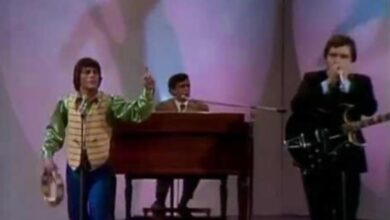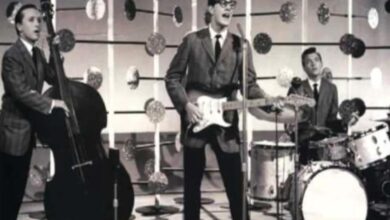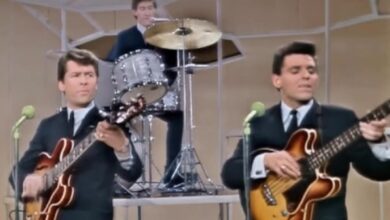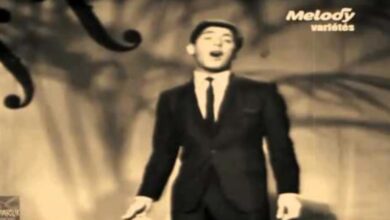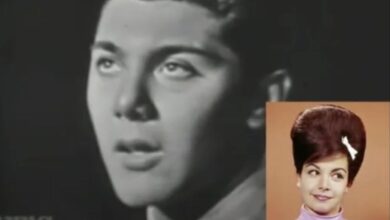Lainey Wilson and Vince Gill Deliver Emotional “Go Rest High on That Mountain” at Emmy Awards In Memoriam
Have you ever watched an awards show pause long enough for the whole room to breathe? That’s the spell Vince Gill and Lainey Wilson cast at the 77th Primetime Emmy Awards, when the stage lights softened, the chatter fell away, and a country hymn rolled over the theater like a benediction. On a night built for celebration and speed, their duet of “Go Rest High on That Mountain” moved at the tempo of memory—slow, reverent, and unshakably sure of itself. You could feel the temperature of the room shift as the first notes landed, not like spectacle, but like ceremony. By the time the chorus unfurled, the show had found its heart, and everyone present seemed to know it.
The moment had a careful architecture. Phylicia Rashad stepped forward first, her voice carrying the authority of a TV lifetime, to frame the In Memoriam segment with grace and specificity. With the audience already leaning in, Wilson and Gill took their marks—two generations of country storytelling sharing one microphone stand. No pyrotechnics, no big-band swell, just an acoustic-led arrangement and two voices that knew how to make stillness feel grand. It was the simplest staging of the evening, and the most cinematic, precisely because it made silence part of the score.
Gill began like he always does—with warmth that feels hand-delivered, the quiet conviction of someone who’s carried this song in sanctuaries and arenas alike. Then Wilson slipped in beside him, her tone equal parts velvet and grit, lifting the harmony without crowding it. The chemistry wasn’t about volume or runs; it was about trust. She let Gill’s lines breathe, then stitched her timbre through the melody like a ribbon. He answered by opening space around her phrases, the way good duet partners do when the lyric matters more than the headline.
And the lyric mattered. Gill wrote “Go Rest High on That Mountain” out of lived loss, a hymn-like climb that has spent three decades at funerals, memorials, and home speakers in the small hours. Bringing that song to a national stage during an In Memoriam segment was more than a booking—it was a thesis statement. The Emmys don’t just mark wins; they mark eras and the people who built them. This was country music functioning as public ritual, a spiritual bridge between the entertainment we binge and the artists who become family by repetition alone.
Inside the Peacock Theater, the screens filled with faces—writers and actors, hosts and composers, familiar names and the behind-the-scenes giants who make television breathe. The music did the stitching. Wilson’s harmony sat right in the pocket on the word “rest,” turning a single syllable into a landing place. Gill’s guitar was a gentle metronome, his picking patterns spinning a soft frame around the names as they appeared. The arrangement never once tried to compete with the montage. It carried it, like hands under glass—firm enough to hold, light enough not to obscure what everyone came to see.
A great memorial performance lives or dies on texture. Here, the texture felt handcrafted. Wilson’s modern country glow met Gill’s classic tenor like glass meeting oak—two tones that shouldn’t blend on paper, and yet did, beautifully. Where some pairings can sound like a vocal tug-of-war, these two traded center stage with easy generosity. In the first verse she leaned back; in the second, he shaded under her phrases; in the chorus they took turns singing slightly under each other, letting the vowel shapes align until the blend sounded like a single, larger instrument.
What made it electric for viewers at home was the cultural ricochet around it. Lainey Wilson’s banner year has been all festival highs and arena sing-alongs; Gill’s legacy is the steadier burn of craftsmanship. Put together, the duet became a conversation between country’s right now and country’s bedrock, speaking a language that television—and its history of family rooms, Friday nights, and ritual viewing—understands instinctively. This wasn’t a genre cameo; it was a reminder that great songs are communal infrastructure, the emotional plumbing under a live broadcast.
Even the camera work cooperated. Instead of relentless cutting, the directors let shots linger—close enough to catch the micro-expressions that happen when a singer means it, wide enough to keep the memorial reel legible. There was a humility to the visual grammar: faces, hands, guitar, names. No sweeping crane to announce a Big Television Moment, yet the effect was bigger for its restraint. In a year thick with flashy set pieces across awards season, this one earned attention by refusing to jostle for it.
Social feeds lit up in real time, not with the usual “who wore it best” chatter but with personal stories. People wrote about the first time they saw a beloved actor on their family TV, about grandparents who kept a favorite game show on during dinner, about how “Go Rest High” played at their father’s memorial and why hearing it now felt like a reunion. That’s the paradox of live television at its most human: millions of private rooms experiencing the same public ritual, each person finding a different face on the screen that stops them cold.
@ashtoncolquett1 9.14.25 Vince Gill and Lainey Wilson performed “Go Rest High on that Mountain” at the @Emmys / Television Academy So touching. #vincegill #laineywilson #emmys #fyp ♬ original sound – Ashton Colquett
Context amplified the resonance. The In Memoriam list this year spanned generations and genres—household legends and character actors you recognize like a neighbor you wave at—but it also contained the kinds of losses that felt too soon. The song’s lyric met that variety head-on, offering comfort without platitude, hope without sugar. A line like “your work on earth is done” lands differently when the montage includes creators whose shows shaped the grammar of streaming and stars who used their fame as a key to service. The performance didn’t fix anything. It didn’t try to. It simply honored.
Musically, one of the smartest choices was keeping the band minimal. No rhythm section to tug the pulse forward; no orchestral pad to sentimentalize the moment. Just air, strings, and breath. That sparseness gave Wilson and Gill permission to play with time—holding a consonant a beat longer here, letting a phrase fall early there—so the performance felt conversational instead of carved in stone. The result was a reading of “Go Rest High” that sounded both classic and newly real, as if the song had been waiting for exactly this kind of room.
Backstage, the logic of the booking made obvious sense. Wilson, who’s crossed from country radio dominance to mainstream pop-culture ubiquity, brings new listeners to moments like this. Gill, whose artistry has always favored substance over splash, brings the steady hand of ritual. Together they offered an In Memoriam that felt welcoming to first-time viewers and deeply respectful to industry lifers. The Emmys often balance speed and sentiment; this year, sentiment won, and the show was better for it.
There’s also an undercurrent worth naming: TV has been saying a lot of goodbyes lately—to formats, to unions’ old rhythms, to beloved shows that ended because the ground keeps shifting under the industry’s feet. In that context, honoring actual human lives with a song about rest and release felt like clarity. The track record of “Go Rest High” at life’s thresholds—weddings, funerals, reunions—gave the room a script everyone knew, whether they’d heard Gill’s original or only encountered the chorus at church or on a viral clip.
When the final chorus arrived, Gill eased up and let Wilson’s voice press a little farther forward, not as a power play but as a handoff. You could hear the audience’s attention lean with it. She didn’t reach for fireworks; she went for focus, landing the melody right on pitch and right on meaning. Then Gill brought them both down softly, the way you land a plane you want people to remember as a good flight, not because of the touchdown, but because of how carefully the pilot read the wind.
As the names faded and the room exhaled, applause came not in a roar but in that rich, low kind of cheer you hear in sanctuaries—respectful, grateful, a little stunned. It’s hard to put a quiet segment in the same highlight reel as big comedy bits or surprise cameos, but this one belongs there. It reminded the Emmys—and the rest of us—why these ceremonies endure. They aren’t just about trophies; they’re about time, and the people who invest their lives turning it into stories we carry forward.
And then, as live television always does, the show moved on. But the residue of that duet stayed. In clips shared the next morning, in comments from viewers who said they cried “out of nowhere,” in think pieces about who was included and who was left for the website’s extended reel, the conversation kept returning to the same point: the performance gave the losses a frame worthy of them. That’s a rare gift on a fast broadcast. Wilson and Gill made it look effortless.
Maybe that’s the highest compliment you can give an In Memoriam: that it made people stop scrolling, sit a little straighter, and think about the lives behind the credits. On a night that crowned new kings and queens of TV, a country hymn walked in, hung the room with quiet, and left everyone a little more tender than it found them. That’s not just good television. That’s good stewardship—of grief, of memory, and of the audience’s trust that, once a year, we’ll get a moment to say thank you and goodbye.
